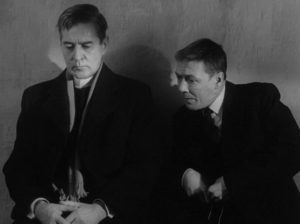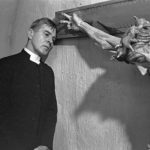 This is the third post on Winter Light, Ingmar Bergman’s remarkable film from 1963.
This is the third post on Winter Light, Ingmar Bergman’s remarkable film from 1963.
We’ve so far considered two of the characters, as vehicles for considering significant points of the movie. The first was Jonas Persson, who killed himself after the pastor’s (Tomas’) clumsy ministering. Persson wanted to know that there was a purpose to life; that there was a God. Without God and without purpose, there was no reason to go on living. The second was Marta, Tomas’ atheist girlfriend. Marta seems to understand Tomas’ faith, though she rejects it. Most notably, she wonders that Tomas seems indifferent to Jesus Christ.
What Bergman was trying to get at here is some understanding of the silence of God. Why does God not reveal Himself to us in some more unmistakeable way? Until near the end of the movie, the only person who seems clearly to have the love of Christ is Magdalena, a widow whose face during the opening scenes indicates a sincere inner passion for the God as revealed in the service. Then near the end we hear more from Algot, a handicapped man who lives modestly and serves as the church’s sexton. He engages Tomas in a discussion that helps us to answer the question that Tomas has been asking internally: Why is God silent?
 Algot has a question for Tomas, that he, Algot, deems important, relating to Christ’s passion. He says he doesn’t understand the emphasis on Christ’s physical suffering; that there seemed a far worse suffering. At this moment the camera shifts (as it rarely does in this movie) to focus entirely on Algot, leaving Tomas outside the frame of the shot. Algot explains that the real suffering must have been the disciples’ denial of Him; their failure to understand Him; their abandonment of Him: “I feel He was tormented far worse on another level.”
Algot has a question for Tomas, that he, Algot, deems important, relating to Christ’s passion. He says he doesn’t understand the emphasis on Christ’s physical suffering; that there seemed a far worse suffering. At this moment the camera shifts (as it rarely does in this movie) to focus entirely on Algot, leaving Tomas outside the frame of the shot. Algot explains that the real suffering must have been the disciples’ denial of Him; their failure to understand Him; their abandonment of Him: “I feel He was tormented far worse on another level.”
At this point, the camera turns to Tomas, exclusively. Algot believes, but has a point of theology on which he seeks understanding. Tomas’s faith has been hanging in the balance, and he hears Algot, in his innocent questioning, remark upon Christ’s silence, too. Tomas comes to understand that exactly the questioning Tomas is undergoing was among the sufferings of Christ Himself. “He was left all alone,” Algot says. He describes the torment Christ must have suffered “to be abandoned, when you need someone to rely on.”
And not only that, Algot continues, but when He was nailed to the cross, He cried, “My God, My God, why have you forsaken me?” Christ felt not only abandoned by His friends, but by God. Jesus must have felt in that moment that everything He had taught was a lie: “In the final moments before His death, Christ was seized by doubt.”
And yet He carried on, trusting that God was real despite His silence. Jesus felt the silence of God, just as Tomas does, and Jesus modeled how to respond: by continuing to believe. We may come to understand God’s silence in eternity, but we are to understand now His silence is not a reason to abandon Him, just as Jesus did not abandon us, but persevered in His mission.
 The movie ends on this note. After Algot relates this, Tomas just says “yes.” It’s time to perform the afternoon service, but no one has shown up. Aside from Tomas, only Algot is there, along with Marta, who arrived with Tomas. Tomas chooses to go on with the service, apparently having chosen, at least for now, to continue in hope that God is real.
The movie ends on this note. After Algot relates this, Tomas just says “yes.” It’s time to perform the afternoon service, but no one has shown up. Aside from Tomas, only Algot is there, along with Marta, who arrived with Tomas. Tomas chooses to go on with the service, apparently having chosen, at least for now, to continue in hope that God is real.
